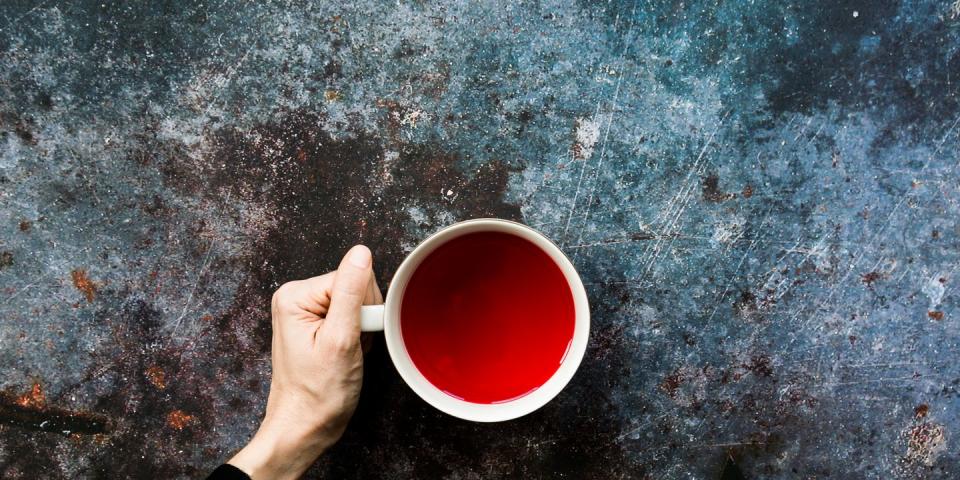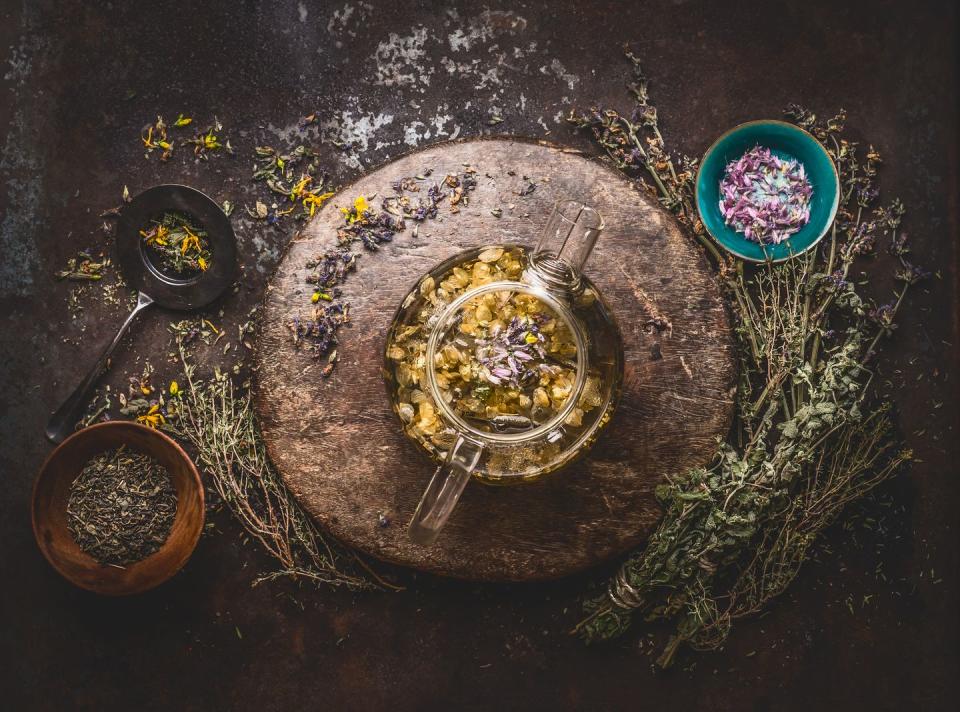18 healthy herbal teas worth buying

Who doesn’t enjoy a comforting cuppa every now and again? Whether you’re sipping a dried herbal tea, brewing fresh leaves, or trying one of the many healthy tea options from your local health store, there’s nothing quite like a fresh pot to soothe the soul.
Traditional teas – which include green tea, black tea, white tea, and oolong tea – are all brewed from the leaves of the Camellia sinensis plant, and vary only in terms of the way they are processed.
Herbal tea, meanwhile, is made from various fruits, flowers, spices and herbs, or a combination of them, so they’re incredibly diverse in flavour. Even though herbal tea has been used as a natural medicine for centuries, the health properties of these teas are only just being established in scientific literature.
18 healthy herbal teas
We asked Dr Tim Bond of the Tea Advisory Panel to talk us through the emerging evidence-backed benefits of a variety of healthy teas.
1. Hibiscus tea
There are several hundred species of hibiscus that vary according to location and climate, but Hibiscus sabdariffa is most commonly used to make hibiscus tea. Known for its tart flavour, hibiscus tea – made from the deep red flower of this tropical plant – is rich in powerful antioxidants and has been shown to be beneficial for heart health.
‘A systematic review of nine randomised controlled trials (RTCs) and six laboratory studies found that hibiscus tea can have a positive impact on cardiovascular health and wellness, particularly blood pressure,’ says Bond. ‘Emerging research also reveals potential benefits in terms of its ability to favourably impact lipid profiles, inflammation, oxidative stress and insulin resistance.’
2. Echinacea tea
Echinacea – also called coneflower – refers to a group of flowering plants that form part of the daisy family. Packed with beneficial plant compounds, it’s been linked to health benefits that range from fighting inflammation to reducing blood sugar levels. Echinacea tea, which is made from both the upper parts and roots of the plant, is frequently used as a cold and flu remedy.
‘Echinacea is high in antioxidants,’ says Bond. ‘Some research suggests that echinacea may help stimulate immune activity to shorten bacterial infections and viruses. A study in 95 people found that five to six cups of echinacea tea daily at early onset of cold and flu symptoms was effective for reducing symptoms compared with placebo.’
3. Sage tea
Delicate, sweet and earthy, sage tea is made from the leaves of the common sage plant, a perennial evergreen shrub that forms part of the mint family. This aromatic herb is rich in anti-inflammatory and antioxidant compounds, says Bond, including rosmarinic acid and carnosol.
‘Sage tea may help to boost heart health,’ he continues. ‘A small, four-week study in six women, drinking 10 x 300ml mugs of sage tea twice daily resulted in 16 per cent lower total cholesterol, 20 percent lower ‘bad’ LDL cholesterol, and 38 per cent higher ‘good’ HDL cholesterol.’
Sage tea may also be beneficial for people with diabetes and women experiencing menopause. ‘A two-month study in 105 adults with type 2 diabetes found that sage extract three times daily improved blood sugar and HBA1c – a measure of blood glucose control over the previous three months,’ says Bond. ‘A 2017 review suggested that sage might reduce menopausal symptoms of hot flushes.’
4. Lemon balm tea
Lemon balm is a lemon-scented herb from the mint family. It’s best known for its stress-soothing properties. ‘Lemon balm tea may help you to relax and unwind,’ says Bond. ‘One small pilot human study showed a 42 per cent reduction in insomnia symptoms after participants received 600 mg of lemon balm extract per day for 15 days.
Lemon balm has been shown to increase gamma-aminobutyric acid (GABA) levels in the brain – an inhibitory neurotransmitter known for reducing overwhelming feelings of anxiety – in laboratory studies, ‘which may explain its sedative effects,’ Bond says. Like sage, lemon balm may also reduce menopausal symptoms of hot flushes.
5. Rose hip tea
Rose hips are small, round ‘fruits’ found just below rose petals. While there are hundreds of species of rose plants, rose hip research has focused mainly on the Rosa canina variety. Rose hip is rich in plant polyphenol antioxidants, and contains antioxidant vitamins C and E, says Bond.
‘Rose hips have the highest vitamin C amongst fruit and vegetables, although amounts vary,’ he says. ‘Vitamin C is an immune function nutrient. There is evidence from laboratory studies that rose hip can benefit immune function parameters though research in humans is so far lacking.’

6. Passionflower tea
There are about 500 known species of passionflower, known collectively as Passiflora. A natural sleep aid, passionflower – specifically Passiflora incarnata – has been shown to reduce symptoms of anxiety and insomnia by boosting GABA levels in the brain.
‘Traditionally, passionflower has been used to help relieve anxiety and improve sleep,’ says Bond. ‘One study in 40 healthy adults found that those who drank passionflower tea daily for one week reported significantly better sleep quality compared to participants who did not drink the tea.’
7. Chamomile tea
An herb that comes from the daisy-like flowers of the Asteraceae plant family, Chamomile is commonly regarded as a mild sedative, and is often consumed as tea before bed to promote sleep. The plant’s calming effects may be attributed to an antioxidant called apigenin, which is found in abundance in chamomile tea, says Bond – apigenin binds to specific receptors in the brain that may decrease anxiety and initiate sleep.
‘A study of 60 nursing home residents found that those who received 400mg of chamomile extract daily had significantly better sleep quality than those who did not receive any,’ he says. ‘Another study involving women who had given birth to a baby and who had poor sleep quality found that those who drank chamomile tea for a two-week period reported overall better sleep quality than those who did not drink chamomile tea.’
8. Rooibos tea
Also known as red tea or red bush tea, rooibos is made from a shrub called Aspalathus linearis, which is native to South Africa. Traditionally, rooibos is made by fermenting the leaves, which turns them a red-brown colour. Typically consumed like black tea, rooibos has a naturally sweet taste and is abundant in antioxidant polyphenols, says Bond.
‘A 2020 systematic review concluded that rooibos seems to benefit the lipid and redox profiles of those at risk of cardiovascular disease,’ he says. ‘It also appears to possess other promising ‘general’ effects on glycaemic control, bone, liver, cognitive and respiratory health. This review also showed – from very preliminary research – that rooibos could support male fertility, namely by reducing oxidative damage and by improving antioxidant defence mechanisms and subsequently improving the sperm quality and function.’
9. Ginger tea
The flowering plant of the Zingiberaceae family, ginger has long been used as a natural remedy for a variety of ailments. Ginger is packed with 400 different naturally occurring chemical compounds, notably gingerols – the main bioactive compound – and shogaols.
The roots have traditionally been used as a remedy for motion sickness, though modern research provides limited benefits for this, says Bond. ‘One 2003 study shows that ginger tea might help motion sickness,’ he says. ‘There is also evidence that ginger tea can both prevent and treat morning sickness.’
Ginger tea may also contribute to weight management and heart health. ‘A 2018 systematic review indicates that ginger may have anti-obesity and weight lowering effects through, amongst others, controlling appetite and fat absorption,’ Bond says. ‘Ginger consumption has also been linked with cardiovascular benefits in human research.’
10. Peppermint tea
An aromatic herb that belongs to the mint family, peppermint is a cross between watermint and spearmint. Its leaves contains several key essential oils, including menthol, menthone and limonene, which are believed to contribute to peppermint tea’s purported health benefits – most notably its ability to ease digestive symptoms such as bloating and indigestion.
‘Traditionally, peppermint has been used to treat stomach ache,’ says Bond. ‘Several studies support the use of peppermint for indigestion and irritable bowel syndrome (IBS). In 2011, Australian researchers showed, for the first time, how it helps to relieve IBS symptoms – by calming the stomach muscles through a specific anti-pain channel to reduce pain-sensing fibres.’
11. Holy basil tea
Also known as tulsi or ‘queen of herbs’, holy basil is a green leafy plant native to Southeast Asia. Every part of the plant, including the leaves, stems, and seeds, are used therapeutically. Holy basil tea is considered to have a wide range of health promoting properties, says Bond.
‘Both laboratory and human studies indicate that it has anti-inflammatory properties that could benefit cardiovascular and metabolic health in terms of lowering blood sugar, cholesterol and blood pressure,’ he says. ‘It may fight inflammation by inhibiting COX-1 and COX-2 inhibitors – the mechanism of action for some anti-inflammatory painkillers.’
12. Nettle tea
Nettle, or stinging nettle, has been a staple in herbal medicine for centuries. The stem and underside of its leaves are covered in needle hairs that release chemicals that cause a stinging sensation when touched. Despite being tricky to handle, nettle is associated with a wealth of health benefits.
“Nettle tea is high in plant polyphenols and traditionally used to treat pain and sore muscles,’ says Bond. ‘Nettle may benefit urinary health. A 2013 trial in 100 men with benign prostatic hyperplasia found that those who consumed nettle had fewer clinical symptoms than those who had the placebo.’
Nettle tea may also help to improve blood sugar level control among people with diabetes. ‘A trial in 92 people with type 2 diabetes found that nettle three times daily reduced blood glucose and HBA1c as well as blood pressure,’ he says.
13. Fennel tea
Fennel is a flowering plant species that forms part of the carrot family – except unlike carrots, it has a strong aniseed flavour. Its seeds are typically dried and used to make a potent tea that tastes a little like liquorice.
Fennel has been found to have an extremely wide variety of health-promoting properties. ‘According to a 2014 scientific review, fennel has antimicrobial, antiviral, anti-inflammatory, antispasmodic, cardiovascular, hypoglycaemic, hypolipidemic, and memory-enhancing properties,’ Bond says.
‘Since it can relax muscles, it can help sleep – and in addition to potential antibacterial effects, it could help gut health,’ he continues. ‘Fennel has also been evaluated for women’s health benefits, with positive findings in dysmenorrhea, premenstrual syndrome, menopause, and polycystic ovary syndrome (PCOS),’ he adds.

14. Turmeric tea
Turmeric originates from the root of the curcuma longa, a flowering plant that forms part of the ginger family. Turmeric tea has anti-inflammatory properties due to the presence of its active ingredient curcumin, says Bond. Curcumin also gives turmeric its striking bright yellow colour.
‘There is documented evidence of benefit for curcumin in osteoarthritis. Some preliminary research indicates that curcumin may reduce accumulation of amyloids linked to development of Alzheimer’s disease,’ he says. ‘And in a 2007 review, there is speculation that turmeric may have immune health benefits.’
15. Chai tea
Chai tea is made from a combination of black tea and spices – most commonly cardamom, cinnamon, fennel, black pepper and cloves, although star anise, coriander seeds and peppercorns are other options, Bond says. ‘Unlike regular tea, which is brewed with water, chai tea is traditionally brewed using both warm water and warm milk,’ he explains. It also tends to be sweetened to varying degrees – so check the sugar content before purchasing.
Black tea is associated with various health benefits, particularly heart health, Bond continues. ‘Drinking three or more cups of black tea daily has heart health benefits,’ he says. ‘Regular consumption of black tea has been associated with reducing blood pressure. Chai tea’s content of spices such as cinnamon and ginger are also associated with health benefits for heart health, blood sugar and digestion.’
16. Lemongrass tea
Lemongrass, also called citronella, is an herb with a lemony aroma and mild citrus flavour. The leaves of this grassy plant are typically brewed to make a refreshing tea. Rich in antioxidants, lemongrass tea has traditionally been used to help promote sleep, boost immunity and help with pain, says Bond.
‘Laboratory research shows that lemongrass has antimicrobial properties particularly against Streptococcus Mutans, a contributor to tooth decay,’ he says. ‘It may promote healthy digestion and protect the stomach lining against damage from medication like aspirin and also alcohol. Lemongrass may promote cardiovascular health – a study of 72 men found that one cup of lemongrass tea reduced blood pressure and heart rate.’
17. Liquorice tea
Liquorice is the common name of a flowering plant called the Glycyrrhiza glabra. There are more than 300 different plant compounds in liquorice, some of which have been shown to have antiviral and antimicrobial properties.
‘Liquorice tea may help aid respiratory health,’ says Bond. ‘Liquorice shows antibacterial effects against Streptococcus pyogenes, which is linked with some sore throats. Gargling with liquorice liquid has been shown to prevent sore throat after surgery.’
Daily use of liquorice has been linked with reduced symptoms of gastro-oesophageal reflux disease, he adds, while adding licorice to Helicobacter Pylori eradication therapy has shown benefits in peptic ulcer.’
18. Spearmint tea
Also known as garden mint, common mint, lamb mint and mackerel mint, spearmint is a perennial plant with a surprisingly sweet taste. Spearmint contains a large number of antioxidant compounds, including rosmarinic acid, limonene and menthol, and also has anti-inflammatory properties.
‘Laboratory research shows that it kills some types of bacteria, fungus, and viruses, suggesting it may have antibacterial, antifungal, and antiviral properties,’ says Bond. ‘A 2007 study found it also offers hope to women with hirsutism, as drinking two cups of spearmint tea a day for five days lowers levels of androgens associated with excessive hair in women.’
Last updated: 17-09-2020
You Might Also Like

 Yahoo Finance
Yahoo Finance 